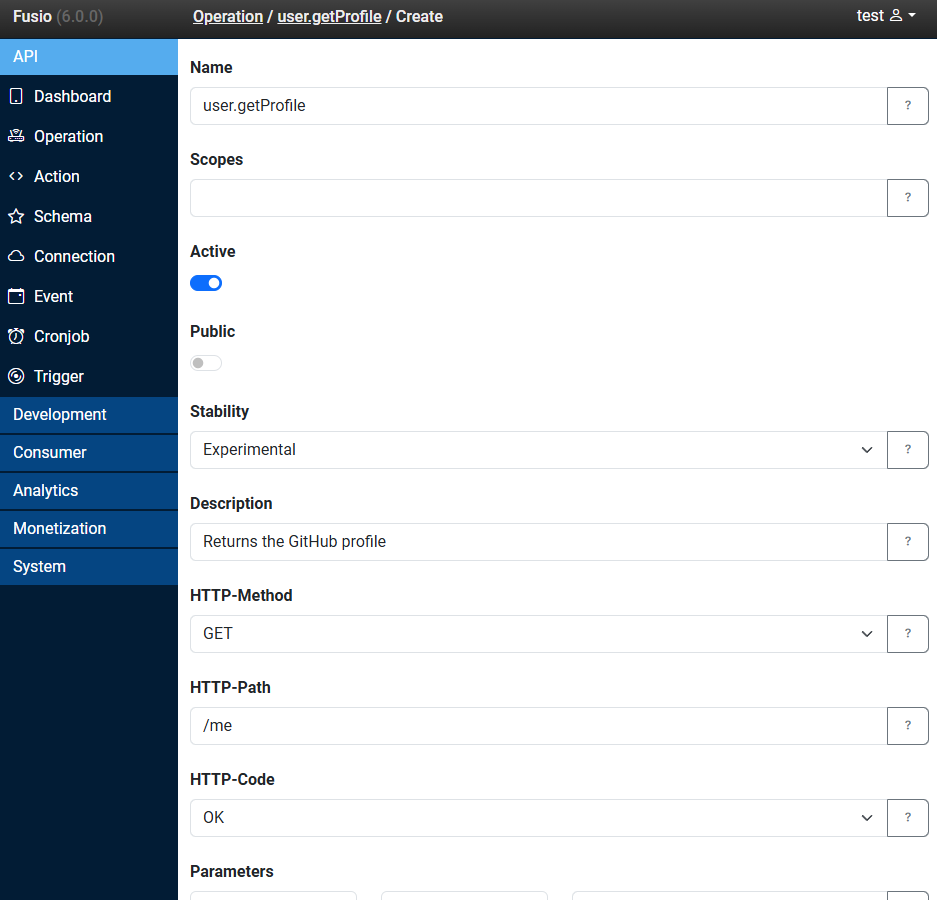Operation
An operation is mapped to a HTTP method and path and invokes a specific action. You can attach various meta information to an operation like the parameters, incoming and outgoing schema or a description. Fusio can use this information to generate a fitting OpenAPI specification or client SDK. If a request method is public it is possible to request the API endpoint without an access token.
Configuration

Name
The name of the operation. It is recommended to use a namespace to separate your operations with dots into logical units
i.e. my.namespace.getAll or my.namespace.update. The generated client SDK will also reflect this namespace i.e.
client.my().namespace().getAll() or client.my().namespace().update().
Scopes
The scopes field defines a set of scopes assigned to an operation. If the operation is protected, an end user needs to obtain a scope in order to access the endpoint.
Active
Whether the operation is active or not. If the operation is not active it is not possible to invoke this operation.
Public
Whether the operation is public or private. If an operation is private (by default) the user needs to private an access token to invoke the operation. The user also needs to have the fitting scope to invoke this operation.
Stability
Indicates the stability of this operation. If the operation is stable it is not possible to change any values.
Description
A short description of this operation.
HTTP Method
The target HTTP method.
HTTP Path
The target HTTP path can contain variable path fragments. These fragments can be accessed inside an action. The following list describes the syntax.
-
/productNo variable path fragment only the request to/productmatches this route -
/product/:product_idSimple variable path fragment. This route matches to any value except a slash. I.e./product/fooor/product/12matches this route -
/product/$year<[0-9]+>Variable path fragment with a regular expression. I.e. only/product/2015matches this route -
/file/*pathVariable path fragment which matches all values. I.e./file/foo/baror/file/12matches this route
HTTP Code
The HTTP success code, this is mostly OK 200 or Created 201
Parameters
Defines all query parameters for this operation.
Outgoing
A schema which describes the success response payload. You can select one of the following schema sources:
- Schema
Selects a preconfigured schema which was previously created at the schema panel. - Class
Reference a PHP class which is available at your source code i.e.App\Model\MySchema. You can also automatically generate those model classes - HTTP/HTTPS
Invokes an HTTP url and resolves the schema - File
Loads a file and resolves the schema - Content-Type
In case the response is not JSON you can select a content type
Throws
Schemas to describe the error response payloads. You can select one of the following schema sources:
- Schema
Selects a preconfigured schema which was previously created at the schema panel. - Class
Reference a PHP class which is available at your source code i.e.App\Model\MySchema. You can also automatically generate those model classes - HTTP/HTTPS
Invokes an HTTP url and resolves the schema - File
Loads a file and resolves the schema - Content-Type
In case the response is not JSON you can select a content type
Action
The action contains the business logic of your API endpoint. It i.e. selects or inserts entries from a database or pushes a new entry to a message queue. You can select different types of actions, the following list describes each type:
- Action
Selects a preconfigured action which was previously created at the action panel. - Class
Reference a PHP class which is available at your source code i.e.App\Action\MyActionthe action class must implement theFusio\Engine\ActionInterface. - HTTP/HTTPS
Invokes an HTTP url, it proxies the request to the endpoint and also adds Fusio specific information - File
Executes the provided action file
Costs
Contains how much a user needs to pay to invoke a route. A user can obtain points by buying a specific plan at the developer portal.